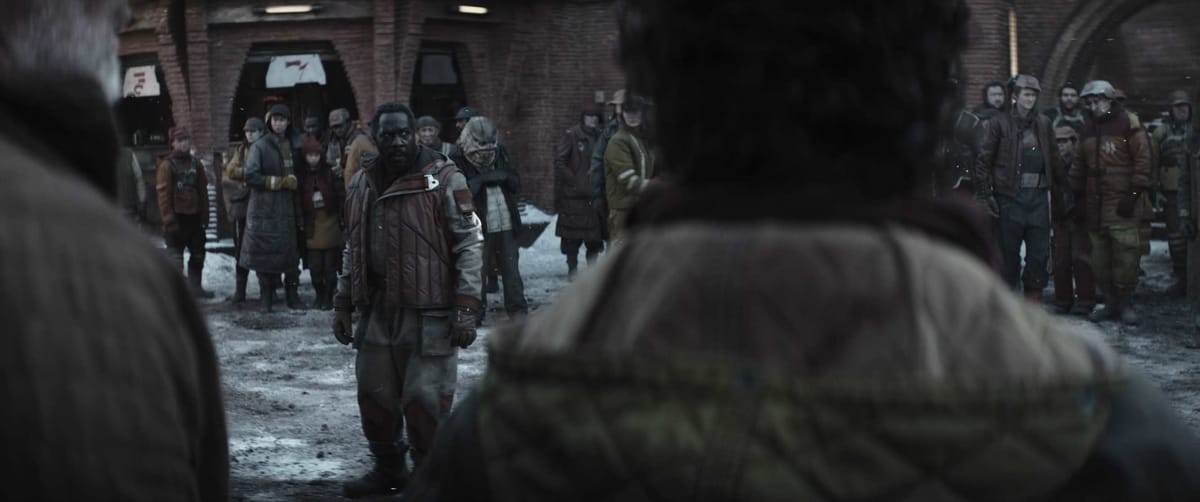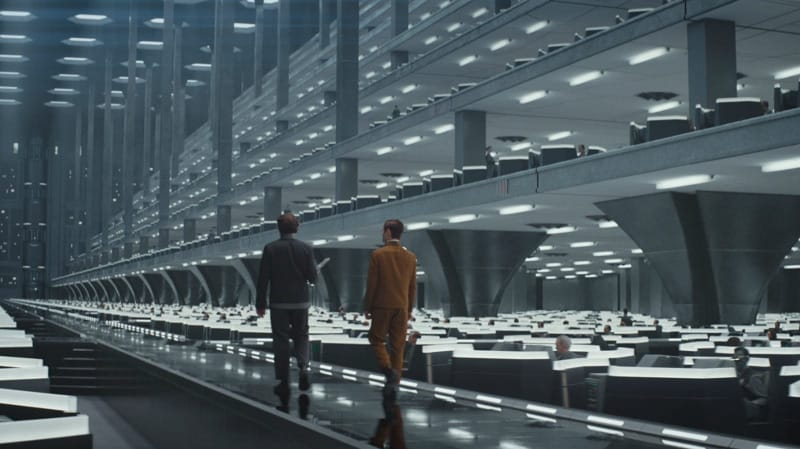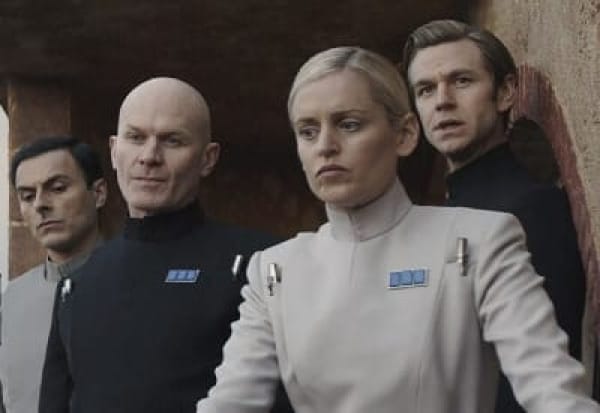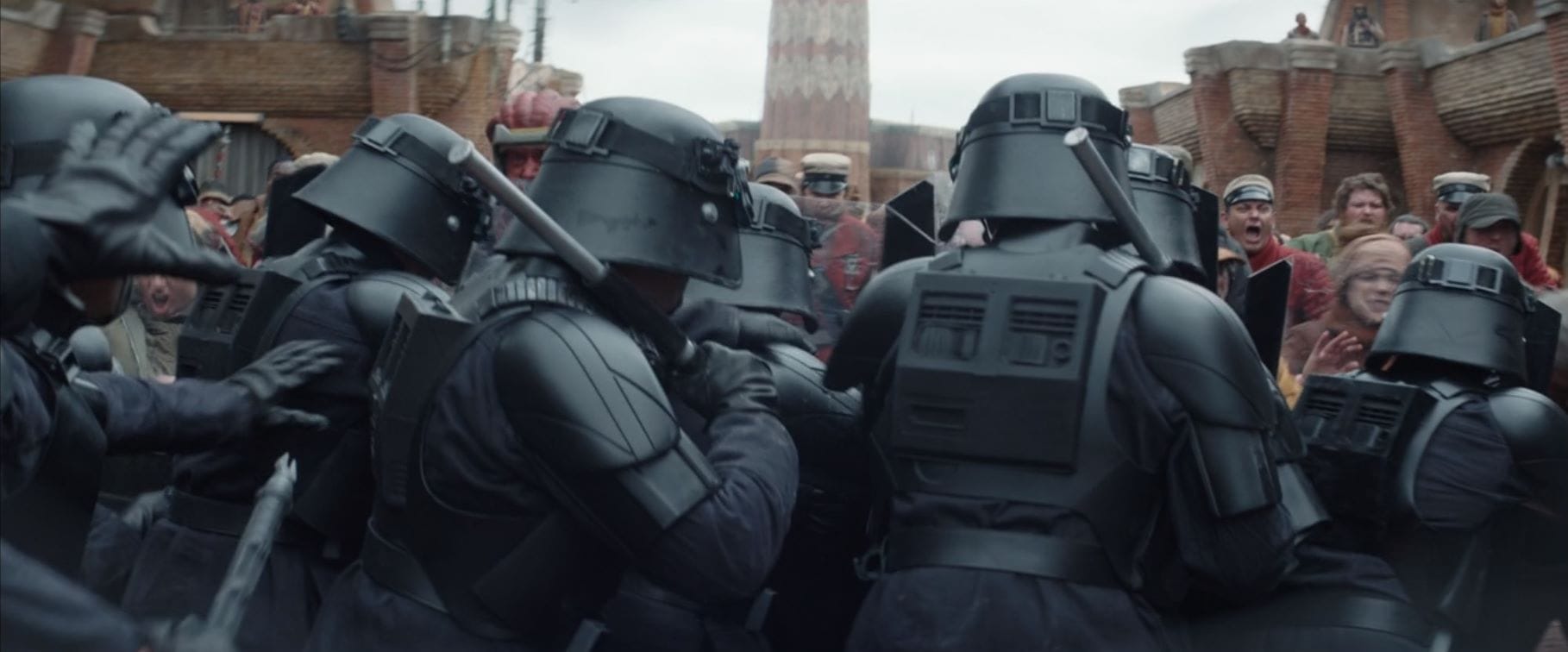andor (so far)
Andor, the British, and the challenges of managing empire - long ago and now.

I flew British Airways for the first time going to and from South Africa. I will not say they were enjoyable flights, because oh my god is South Africa far away, and adding six- to ten-hour layovers in Heathrow did not help. (The Heathrow experience will be the subject of a future rant.)
I will say, however, that British Airways exuded competence at every step of the way - a kind of competence that struck me as especially British, and I had a little familiarity with that when I lived in England for a year, and more recently having worked with way too many British colleagues. Everybody at BA knew their job. Everybody did their job. They welcomed us onto the plane with a smile, because part of the job of welcoming people onto a plane is to smile at them. Smiling is not necessarily part of the job of aiding people with their luggage, so they did not always smile when doing that. (I did get unnecessary, but welcome, smiles from a Scottish flight attendant, but sadly he was mostly on the other side of the cabin.)
During the safety demonstration, they pointed out the exits clearly and emphatically. (You should totally watch the safety video, by the way.)
When they delivered drinks, the first cart had cold drinks, because before one's meal one has a cold drink, not a warm one. After our meals we were offered tea or coffee. They accepted and complied with my extremely American request for tea with no milk, which once took a server at the University of Exeter three tries to get right. The meals were reasonably edible, particularly when I scored an upgrade to “World Traveler Plus” - one might not expect edible airline meals from the English, but there it was. The announcements from the flight deck were clear and polite and devoid of the chatter you might hear on an American carrier. As we started to land in New York, the flight attendant quickly snapped my video screen back into place without request or apology, because it was time to put my video screen away.
Everything said, “There is a right way to do this, and we are doing it the right way.” I felt safe and cared for, but without an ounce of doting or indulgence.
When my video screen was abruptly stowed, I was watching Episode 5 or 6 of Andor, the Star Wars spinoff whose Season 2 dropped earlier this year. Andor is without question the best Star Wars project to date, including the original movie, and it’s not especially close. That may or may not be saying much, so I will go further and say that, so far, it’s in the top tier of television that I’ve seen - less intellectual and more pew-pew than The Wire, but in acting, direction, dialogue and especially theme, right there with it. (Caveat: I’ve just finished rewatching Season 1; perhaps it goes off the rails in Season 2.)
And watching Andor while immersed in that British brand of competence, I realized how British-coded the series is.
Andor is about many things, but one of the themes that dawns on you over the course of the first season - and on rewatching turns out to be front and center from the first ten minutes of the first episode - is what it takes to maintain an empire. It’s a show about, in a sense, the banality of evil. Not exactly in the Hannah Arendt/Rudolph Eichmann sense (which I am no expert on), but in the way that so many people are simply doing their jobs to keep the whole affair running.

So. Many. People. Doing work that would be soul-sucking if any of these people demonstrated that they had souls, which is only occasionally true. They show up and clock in, they carry out orders, they go home. The ambitious ones work late; the ones desperate for approval work late because their bosses are working late. They bicker and undermine each other and otherwise claw for notice and promotions. Their supervisors give them directives and expect them to be carried out, and lose patience when their underlings don’t see the bigger picture. The bigger picture is only bigger insofar as it is more than what the underlings can see, but less than what the superiors’ superiors have a view of, and so on up the chain.
Above all, the management of an empire is about order, and snapping back into place anything that threatens to disrupt it. The British are, or at least were, really good at this. It still shows in the way they operate airplanes.
When I say Andor is British-coded, I don't mean merely that the actors are British, although certainly a host of them are. (They're strong actors, actors who know how to speech the speeches, but more, how to play scenes like they're determined to get what they want, whatever it takes. The quality of acting is not particularly what one dwells on when one thinks of Star Wars, you know, but these folks, British and otherwise, know what the hell they're doing, from Diego Luna on down to the least functionary handing a report to a commanding officer.)
But it's not just plummy accents and RSC training. They speak like British folks. The lines teem with British idioms. They hold themselves like the whole place is Eton: some, over-eager collegers with their tongues practically lolling out; others the Div Masters, impatient with sycophants but zeroing in when they encounter someone who shows evidence of being the real thing. And some are the charwomen and porters, blindly carrying out duties to the letter. The quartermaster protecting his fief shows up; so does the straight-arrow rule-follower, shocked to the point of incapacitation by anything that hints of going along to get along. The sneering attitude toward local customs, the amusement at the behavior of the primitives. The fetishization of our way of doing things.

Hierarchy, and obeisance to hierarchy, because that's the way you keep an empire running.
I think Americans aren't good at that. As much as we may resemble, and at times behave like, an imperial power, we don't have the instinct for managing people in far-flung places. We acquire colonies and then neglect them, until we decide it's not worth the trouble and cut them loose. (Feel free to mention the exceptions that prove the rule.) Our instinct is revolutionary, not managerial, which makes us exceptionally bad at showing up somewhere like Afghanistan or Iraq or Panama and trying to install order. We don't like order. And we certainly don't like investing in the kind of effort it takes to maintain order.
Which is what makes Andor, at this particular moment, so compelling. Watch the scenes - choose any you like, but the last episode of Season 1 will certainly serve, where the Empire's tanks are rumbling down Rix Road amid the populace of the planet Ferrix. Then watch the news from Washington. The actions of the occupying forces are practically interchangeable, but the psychology feels out of sync. They're both terrifying, of course, especially when you ponder the Star Wars arc about to follow; the decades of violence and misery, the destruction of whole planets. And yet, the British - I mean the Empire, forgive me - are going to be in some measure successful, for a time anyway, because they've spent decades, centuries maybe, learning how to do this stuff, training their young leaders on the playing fields of Eton, building into the DNA of their society an instinct for order from the top to the bottom rungs.
We haven't done that. We resist the idea of rungs, even as obvious as they have been at every turn, for the entirety of our history, if people just open their eyes. In the States, the billionaires and the wanna-be billionaires and their sycophants have to cloak themselves in the language of egalitarianism, even as they ban the word "equality" from public life.
The question that faces us, all of us, regardless of how we may react to the sudden, violent - in all senses - changes in American society, is whether that preference for order is something we will learn on the fly. Whether, on the one hand, we're going to tolerate the idea of Humvees patrolling the streets, picking up our friends and neighbors and the people who harvest and cook and deliver our food, or whether, at some point, like the people of Ferrix, we'll start throwing rocks rather than sandwiches.

(In the world of Andor, when that happens it is not without cost. A difference between Andor and the rest of Star Wars is that when Andor's stormtroopers shoot, they don't miss.)
Equally unclear to me, in light of Andor, is whether the functionaries at the Department of Agriculture and the Department of Commerce and the GAO will be content, day after day, year after year, to carry out orders that are at best appearances pointless, and upon interrogation hostile to themselves and their families and their concept of the nation. Whether a newer instance of leadership - "leadership" - will hold the current line, or whether the next set of evil geniuses and equally evil morons will be more consumed with their personal agendas and begin behaving, in the American way, like cowboys. And whether, especially, the troops and their commanders and their commanders' commanders are going to have both the patience and the stomach to enforce order on a people not naturally given to it - and to embrace the ideology necessary for that kind of order themselves. (In the short term, as history shows us often, plenty of people will embrace the necessity of following orders and ignore ideology.)
One thing certain: our institutions have shown themselves to be as performative and useless as the Imperial Senate.
Andor - so far - doesn't pretend to show how we got here (and I'm not well-versed enough in the Star Wars canon to know what other titles might do so). For that matter, to whatever extent Andor might show us what comes next, it's probably useful to remember that it remains a fantasy.
As a lens on our current fight, though, maybe it reveals the enemy's weakness.
Apparently Foreign Policy got to this topic before I did. I made a point of not reading the article before I got my thoughts down, and I still haven't because the article is paywalled and the Brooklyn Public Library doesn't seem to carry the magazine. The folks at FP probably know more about this stuff than I do.